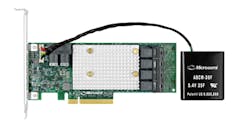SATA and SAS have been challenged by flash storage devices because of the high throughput possible with these devices, but rotating magnetic media still retains its edge when it comes to capacity. This is why a lot of these drives and controllers continue to be sold even as NVMe becomes the norm for many enterprise (and even desktop) installations. Hard drives still account for more than 80% of the drives being shipped.
Microsemi’s latest Adaptec controllers deliver high performance, low power, and reliability for high-density storage applications using the latest 6/12 Gbit/s SATA/SAS interfaces. The trio includes the Adaptec HBA 1100, SmartHBA 2100, and SmartRAID 3100 families. These are based on the latest 28-nm SmartIOC 2100 and SmartROC 3100 storage controllers (see photo). The 1100 and 2100 use the SmartIOC 2100, while the 3100 uses the SmartROC 3100 controller.
The compact, half-length, half-height PCI Express cards come in versions with up to 24 ports. The HBA 1100 targets software defined storage (SDS) applications in hyperconverged infrastructures. It is well suited for cold storage applications, and can handle SSD-centric server applications with cacheless RAID 0, 1, 10 support. It can deliver up to 1.7 million input/output operations per second (IOPS).
The SmartHBA 2100 can also tackle SDS applications, but adds hardware RAID 0, 1, 10, and 5 support. The basic configuration supports eight ports. Its mixed mode operation enables drives to be independently configured as raw drives or as part of a logical RAID volume. The former provides optimum SDS support, while the latter provides server offload support.
The SmartRAID 3100 is optimized for enterprise storage applications requiring data availability and caching performance with hardware RAID support. The Zero Maintenance Cache Protection (ZMCP) handles on-board caches up to 4 Gbytes. The cache backup circuitry is not integrated rather than being an add-on board. This reduces cost while improving thermal performance and operating efficiency. It works with the maxCache 4.0 included on all adapters with up to a 2 Tbyte SSD cache.
The maxCrypto controller-based encryption support will be available with future versions. This provides encryption support without requiring self-encrypted drives (SEDs).
The maxCache firmware supports up to 32 SSD cache pools. It supports read, write through, and write back caching. It can also be enabled on a per logical RAID volume basis. This can provide a performance boost up to eight times that of hard drives alone.
All of the adapters can be managed from the Adaptec MaxView applications. This includes command line and GUI interfaces. It supports pre-boot configuration, works with third party plug-ins and monitoring applications, and supports all major operating systems.
Overall, the new systems provide a 70% performance boost over the previous generation. These new adapters also reduce power by 40%.


